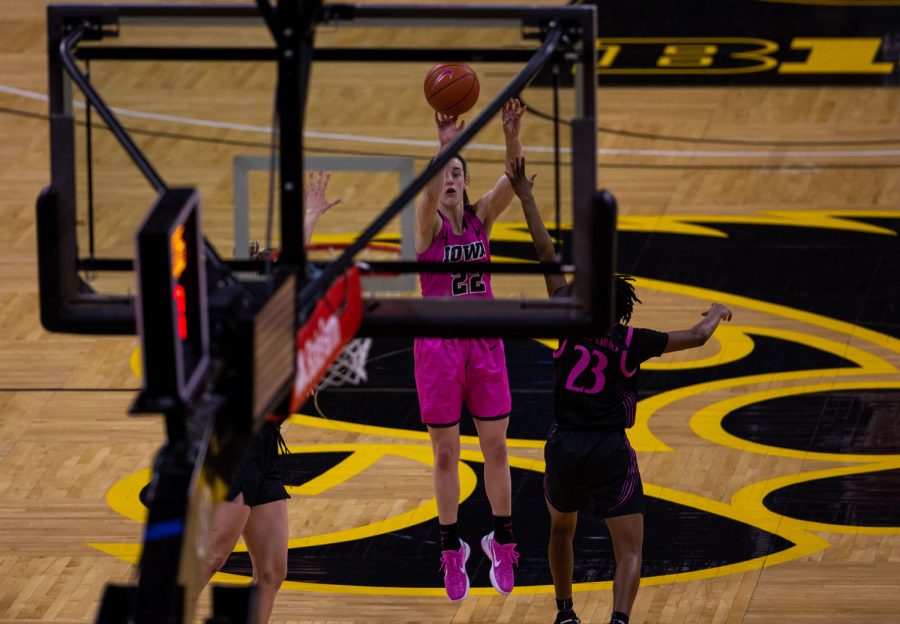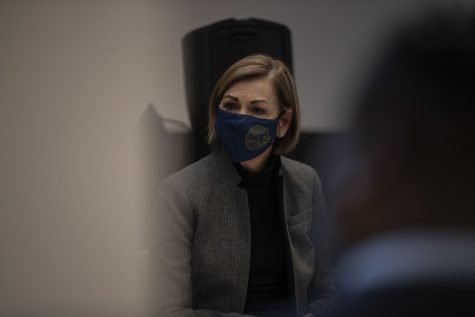Opinion | Collegiate athletes should be able to make money in Iowa
Iowa should pass SF 245, allowing for collegiate athletes to earn compensation from their name, image, and likeness.
Iowa Guard Caitlin Clark sinks a three pointer from behind the center of the arc during a women’s basketball game between the Iowa Hawkeyes and the Penn State Nittany Lion’s at Carver-Hawkeye Arena on Thursday, Feb. 18, 2021. Iowa Defeated Penn State 96-78.
February 21, 2021
The NCAA has been notoriously stagnant when it comes to addressing the issue of whether college athletes should be able to profit off their name, image, and likeness. It’s not surprising that the governing body of collegiate athletics has no sense of urgency on this issue, considering how much money the NCAA makes off student athletes.
According to the NCAA, “name, image, and likeness,” are the three components of the right of publicity. Any situation where permission is obtained to use any of them would fall under the right of publicity. Current NCAA rules prohibit student athletes from receiving payment based on use of their name, image, or likeness. The current system results in the NCAA, universities, and other partners profiting in huge numbers, at the expense of student athletes.
In recent years, multiple states have bypassed the NCAA in moving to pass legislation allowing collegiate student athletes to be paid. The states that have passed legislation include California, Florida, Colorado, New Jersey, Nebraska, and Michigan, with Iowa being the most recent to introduce similar legislation. SF 245 should be passed through Iowa’s Legislature which will allow athletes to profit off their own marketability.
Collegiate athletes deserve to make money off their name, image, and likeness. Being a college athlete is a time commitment similar to a full-time job, regardless of the sport. Student athletes devote most of their time to either their sport or academics, leaving little time to earn spending money for themselves.
Both male and female athletes would benefit from the opportunity to profit off their marketability, but it may be especially important for women. As Iowa women’s basketball player Caitlin Clark noted, many female athletes may have more opportunities in college that won’t be there at the professional level. There are less opportunities for women to continue their sport professionally, leaving their college years as a prime time for optimizing marketability.
Leveling the playing field for all athletes to market themselves may bring an end to some corruption we’ve seen from collegiate athletics in recent years. In 2019, a well-known scandal in collegiate basketball included coaches and ex-Adidas executives conspiring to pay the families of top recruits, thus persuading them to attend an Adidas sponsored school. Allowing athletes to profit off their own marketability forces athletic apparel companies to make deals with athletes out in the open, creating more of a free market system.
As the NCAA continues to postpone action on the issue, and the federal government has its sights set on more pertinent issues like COVID-19, state governments have resorted to legislative action. Passing SF 245 is crucial for Iowa’s universities and athletes. This bill will keep Iowa universities competitive in recruiting, while providing current student athletes with the best possible opportunities.
The bipartisan bill introduced by state senators Brad Zaun and Nate Boulton gives Iowa the opportunity to be on the forefront of reforming collegiate athletics. Passage of this bill could mean a rule change effective on July 1, the same day as Florida. Iowa athletes could be granted these rights before many student athletes across the country, and failure to pass this bill will only leave them at a disadvantage.
Columns reflect the opinions of the authors and are not necessarily those of the Editorial Board, The Daily Iowan, or other organizations in which the author may be involved.
















